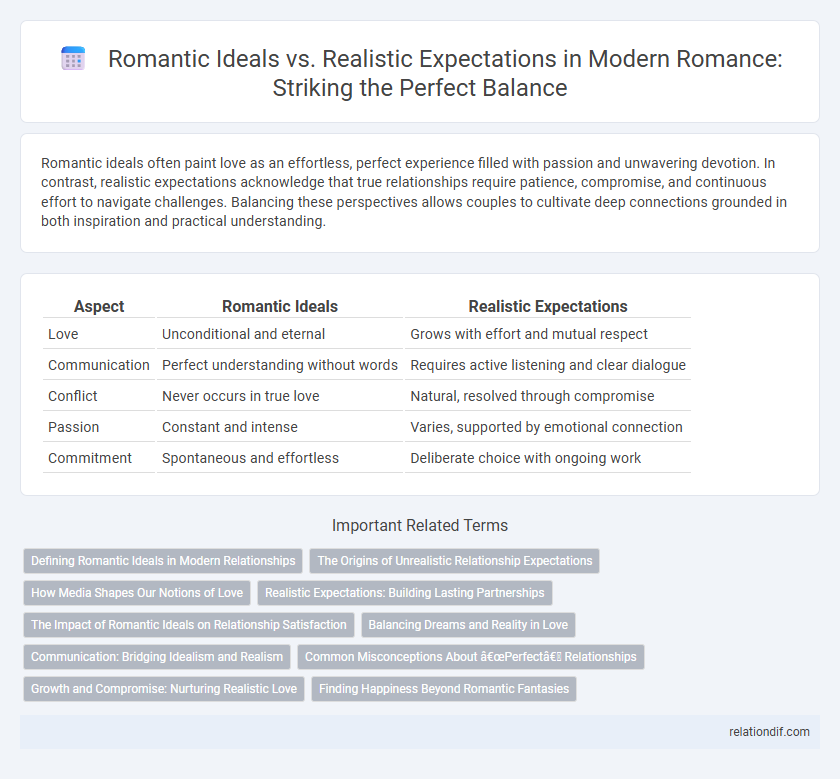Romantic ideals often paint love as an effortless, perfect experience filled with passion and unwavering devotion. In contrast, realistic expectations acknowledge that true relationships require patience, compromise, and continuous effort to navigate challenges. Balancing these perspectives allows couples to cultivate deep connections grounded in both inspiration and practical understanding.
Table of Comparison
| Aspect | Romantic Ideals | Realistic Expectations |
|---|---|---|
| Love | Unconditional and eternal | Grows with effort and mutual respect |
| Communication | Perfect understanding without words | Requires active listening and clear dialogue |
| Conflict | Never occurs in true love | Natural, resolved through compromise |
| Passion | Constant and intense | Varies, supported by emotional connection |
| Commitment | Spontaneous and effortless | Deliberate choice with ongoing work |
Defining Romantic Ideals in Modern Relationships
Romantic ideals in modern relationships often emphasize deep emotional connection, mutual respect, and unwavering support, shaping partners' expectations of love and commitment. These ideals serve as a guiding framework but can clash with the complexities of everyday life, requiring a balance between idealism and practical understanding. Embracing realistic expectations helps couples navigate challenges while maintaining the core values that define meaningful romance.
The Origins of Unrealistic Relationship Expectations
Romantic ideals often stem from cultural narratives, fairy tales, and media portrayals that emphasize perfect love and flawless partners, creating unrealistic relationship expectations. Psychological theories suggest that early childhood experiences and attachment styles shape individuals' visions of romance, sometimes leading to idealized fantasies rather than practical understandings. Sociocultural factors, including peer influence and social media, further perpetuate myths of effortless love, causing discrepancies between romantic ideals and real-life relationship dynamics.
How Media Shapes Our Notions of Love
Media often portrays love through idealized narratives filled with grand gestures and perfect compatibility, creating unrealistic expectations for romantic relationships. These portrayals shape public perceptions by emphasizing passion over communication and conflict resolution, leading to disappointment when real-life relationships encounter challenges. Understanding the influence of media is crucial for developing a balanced view of love that integrates both romantic ideals and practical realities.
Realistic Expectations: Building Lasting Partnerships
Realistic expectations emphasize communication, mutual respect, and emotional growth as the foundation for lasting partnerships. Unlike idealized romance, this approach acknowledges human imperfections and the need for compromise to navigate challenges together. Prioritizing trust and shared values fosters resilient bonds that endure beyond initial passion.
The Impact of Romantic Ideals on Relationship Satisfaction
Romantic ideals often create high expectations that may lead to dissatisfaction when reality falls short of perfection, influencing overall relationship satisfaction. Studies indicate that partners who hold idealized views of romance tend to experience greater disappointment and conflict due to unmet expectations. Balancing romantic ideals with realistic understanding fosters healthier relationships and enhances long-term satisfaction.
Balancing Dreams and Reality in Love
Romantic ideals often paint love as an effortless passion filled with grand gestures and perfect harmony, but realistic expectations acknowledge the importance of communication, compromise, and growth over time. Balancing dreams and reality in love involves embracing both the enchanting moments that inspire the heart and the practical challenges that build a lasting partnership. Couples who harmonize imagination with honesty tend to create stronger, more fulfilling relationships grounded in mutual understanding and respect.
Communication: Bridging Idealism and Realism
Effective communication creates a vital bridge between romantic ideals and realistic expectations by fostering honest dialogue and mutual understanding. Expressing feelings clearly while listening attentively allows couples to navigate different perspectives and align their visions of love. This balance reduces misunderstandings and nurtures a relationship grounded in both passion and practical empathy.
Common Misconceptions About “Perfect” Relationships
Romantic ideals often portray relationships as effortlessly flawless, yet this misconception overlooks the importance of communication, compromise, and growth amid challenges. Realistic expectations embrace imperfections and recognize that emotional resilience and mutual respect create lasting bonds. Understanding these nuances helps debunk myths about "perfect" relationships, fostering healthier and more fulfilling partnerships.
Growth and Compromise: Nurturing Realistic Love
Romantic ideals often emphasize flawless passion and constant excitement, yet real love thrives through mutual growth and compromise, fostering deeper connection and understanding. Embracing imperfections and evolving together cultivates a sustainable relationship that adapts to life's changing dynamics. Prioritizing communication and empathy transforms unrealistic expectations into a grounded, nurturing partnership.
Finding Happiness Beyond Romantic Fantasies
Romantic ideals often paint an enchanting picture of love filled with passion and perfection, but embracing realistic expectations allows individuals to cultivate deeper, more sustainable relationships. Understanding that flaws and challenges coexist with affection helps foster genuine connection and personal growth. Finding happiness beyond romantic fantasies involves appreciating the complexity of love while nurturing empathy, communication, and mutual respect.
romantic ideals vs realistic expectations Infographic

 relationdif.com
relationdif.com